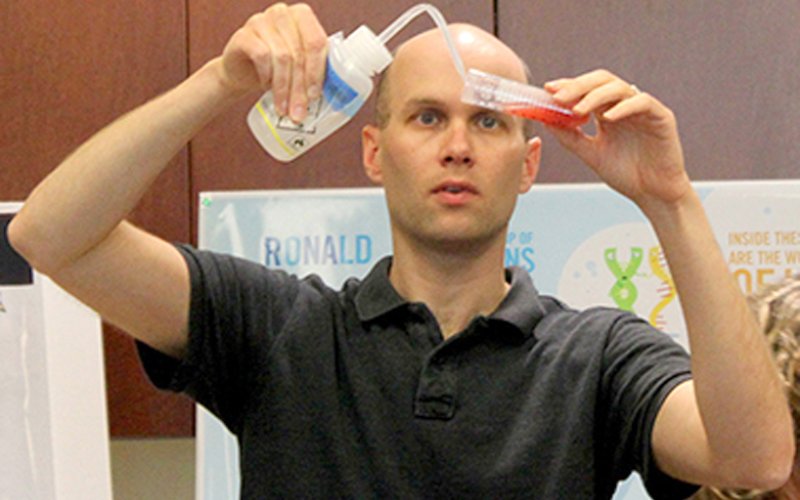RNA Scientist Receives NSF Funding for Rapid Coronavirus Testing

Ken Halvorsen, shown here extracting DNA from strawberries at an RNA Community Day, is a senior research scientist at the RNA Institute.
ALBANY, N.Y. (May 7, 2020) – A biomedical engineer is leading new research that could soon deliver coronavirus test results much faster and at much lower cost.
Ken Halvorsen, a senior research scientist at the RNA Institute at the University at Albany, was recently awarded funding from the National Science Foundation’s (NSF) Rapid Response Research (RAPID) program to develop the test. His lab had been working on a “DNA nanoswitch” to detect SARS-CoV-2, the virus strain that causes COVID-19. The current crises altered the focus and timing of his lab’s efforts.
“With the COVID-19 outbreak, we are working to address the need for additional and alternative testing by re-engineering our own DNA nanoswitch technology into a coronavirus test,” he said. “Due to the urgency, we are putting a big effort into squeezing a 1-2 year project into about 2-3 months, at which point we will test clinical samples with our collaborators at the Wadsworth Center. The ultimate goal is a commercially viable test that can positively impact the current pandemic.”
Halvorsen’s lab, working in collaboration with the Wong Lab at the Wyss Institute on re-engineering their DNA nanoswitch assay, has dual goals of delivering COVID-19 test results within one hour and without the use of a laboratory.
Andy Berglund, professor of Biology and director of the RNA Institute, commented, “It is exciting that the National Science Foundation recognized the importance of Dr. Halvorsen’s research and its potential application to the current COVID-19 pandemic through the RAPID funding mechanism.”
In March, the U.S. Congress pumped up the RAPID program, specifically to fast-track COVID-19 research.
DNA nanoswitches can provide a faster, less expensive method for detecting biomolecules, including viral RNA. Different from other RNA tests, it does not require enzymes, which are a key driver of the cost, complexity, and supply chain issues associated with current testing.
Wait time for the results of COVID-19 testing have been frustratingly long — often several days or more. Halvorsen believes his team’s rapid-response test could soon be commercialized and help to significantly cut down on this lag time. Beyond COVID-19, their test is modular, programmable and can be adapted for other viruses when widespread testing is needed.
You can learn more about the Halvorsen Lab by visiting its website.




